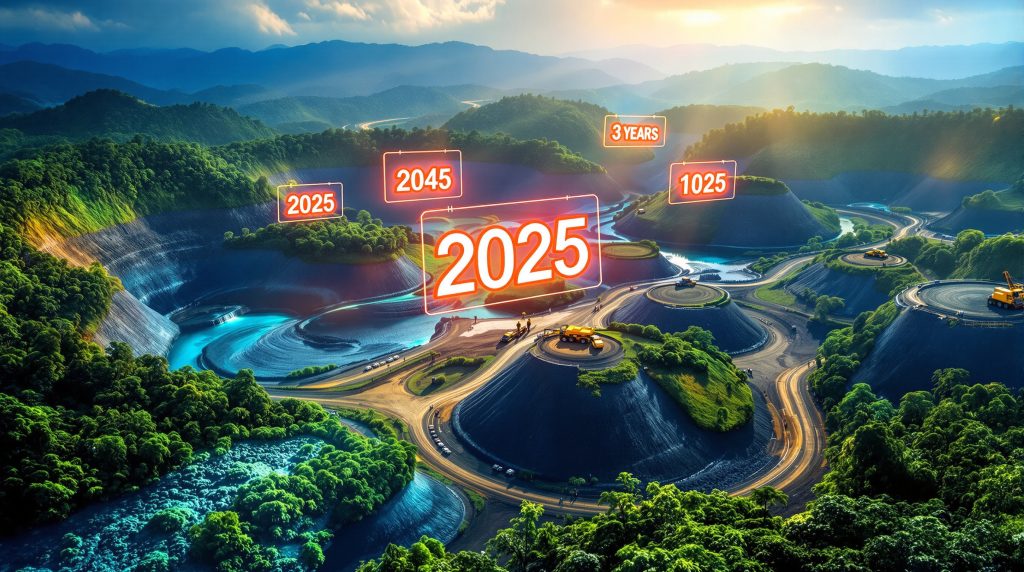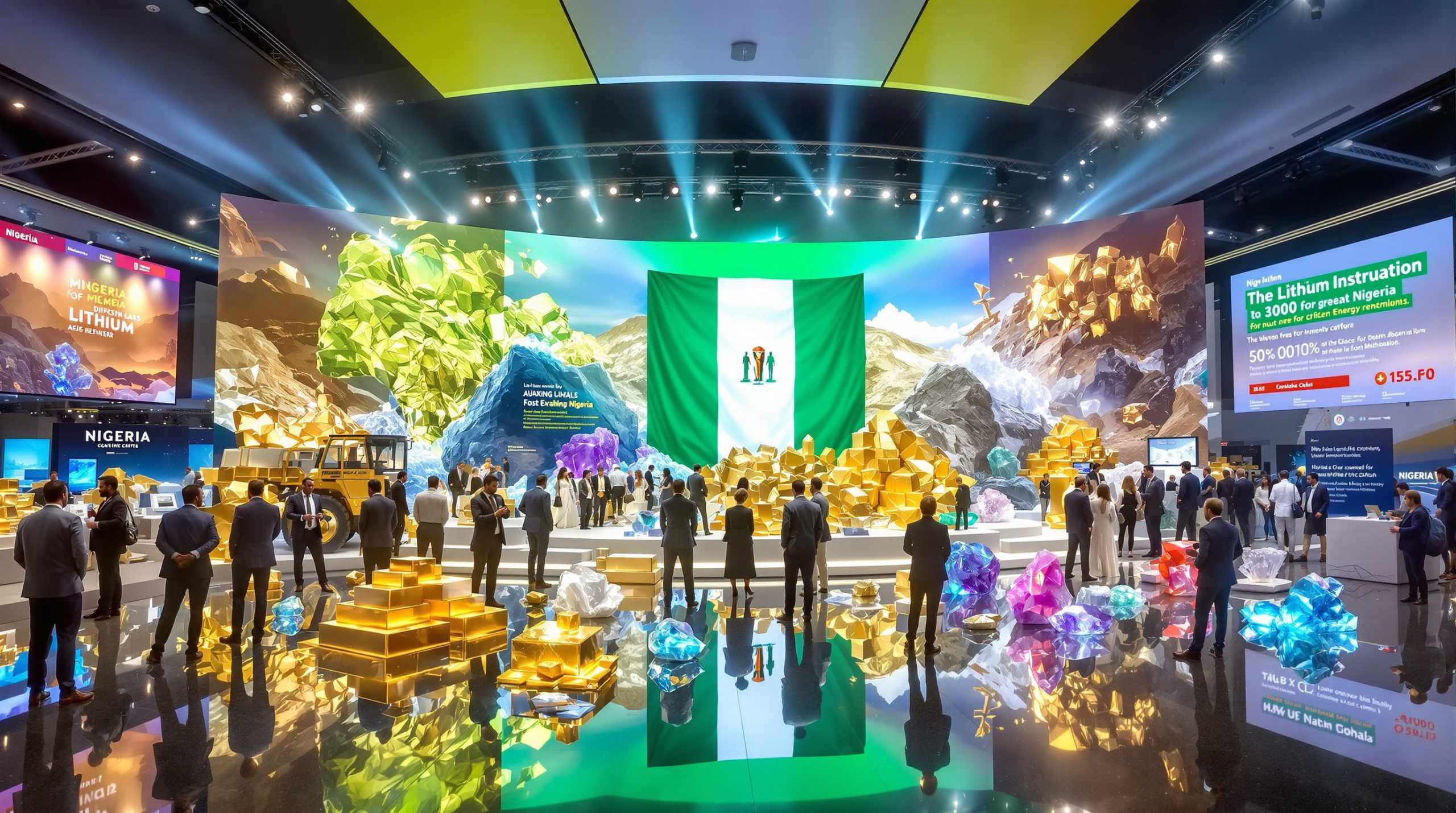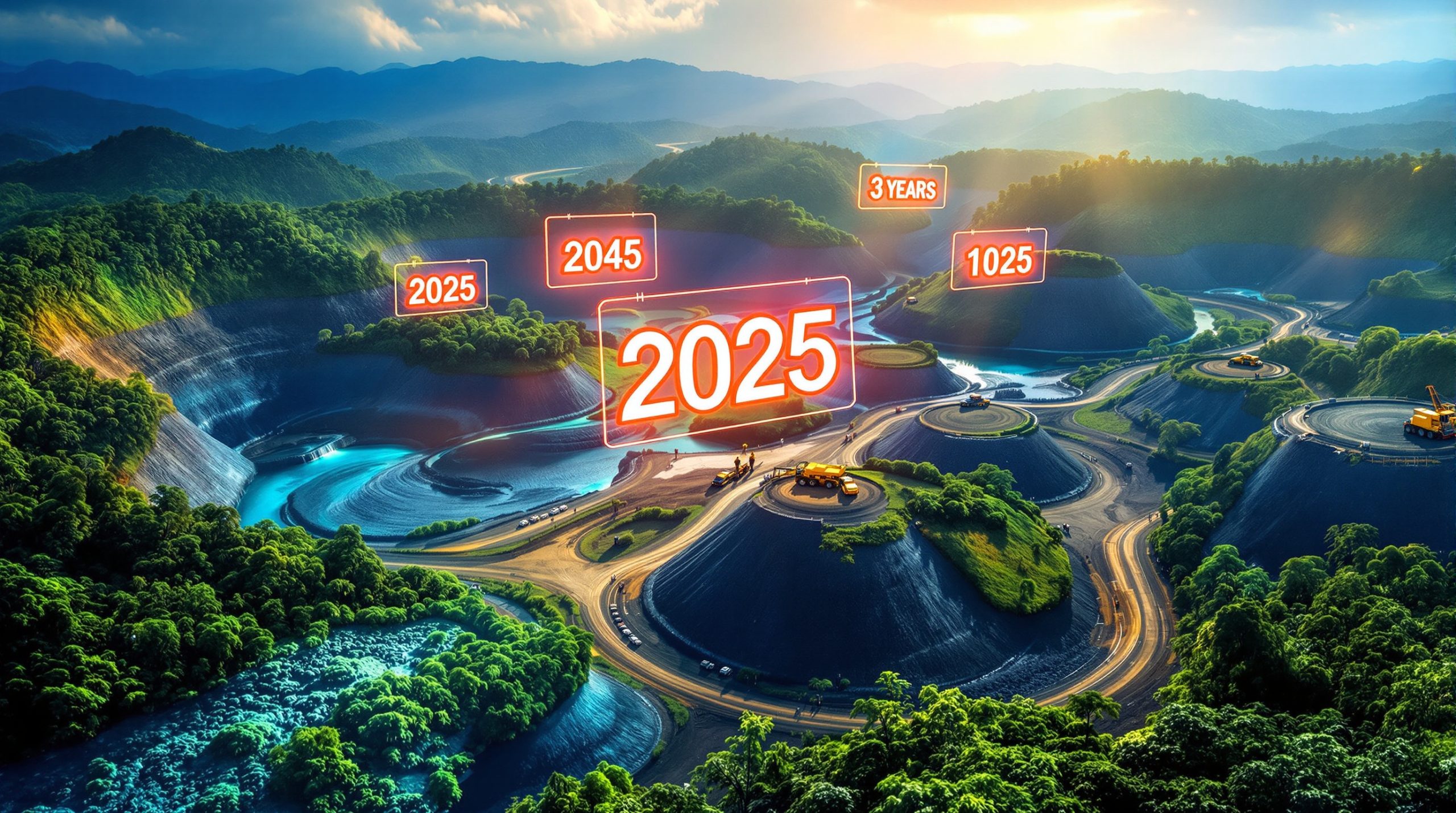Indonesia's Mining Quota Reform: Impact on Production, Prices, and Operations
In a significant shift affecting the entire mining sector, Indonesia has reduced the validity period of mining production quotas from three years to just one year. This policy change, effective October 3, 2025, represents a fundamental realignment in how the resource-rich nation manages its valuable mineral assets.
Mining companies must now navigate an annual approval process rather than planning operations around multi-year authorizations. This reform reflects Indonesia's broader strategy to exercise tighter control over its natural resources, particularly its globally significant nickel and coal reserves.
What Are Indonesia's New Mining Production Quotas Rules?
From Three Years to One Year: Understanding the Policy Shift
Indonesia's mining ministry has fundamentally altered the timeframe for production authorizations, slashing the validity period by two-thirds. Previously, mining operators could secure approvals for three consecutive years, providing medium-term operational certainty. Under the new framework implemented in October 2025, all mining production quotas will expire annually, requiring fresh applications for each calendar year.
This change impacts all mining operations nationwide, covering the extraction of key commodities including nickel, coal, copper, bauxite, and other minerals. The shortened timeframe creates a more dynamic regulatory environment where production levels can be reassessed and adjusted annually.
The Annual Application Process
Mining companies must now submit their detailed Work Plan and Budget proposals (commonly known as RKAB) during a specific 45-day window between October 1 and November 15 each year. These documents outline proposed extraction volumes, operational plans, and environmental management strategies for the upcoming calendar year.
The compressed application period creates a significant annual administrative exercise for both mining companies and regulatory authorities. Once submitted, the mining ministry evaluates these proposals against national production targets, market conditions, and environmental compliance records before issuing approvals.
Transition Arrangements for Existing Quotas
The policy implementation includes specific provisions for mining companies that had previously secured multi-year approvals:
-
Production quotas already approved for 2025 operations remain valid through December 31, 2025
-
Any previously granted authorizations for 2026 and 2027 are now invalidated
-
Companies must submit fresh applications under the new annual system for operations beyond 2025
This transition mechanism creates immediate planning challenges for companies that had secured longer-term approvals and made operational commitments based on those authorizations.
Why Has Indonesia Changed Its Mining Quota System?
Government Control Over Commodity Production
Indonesia's primary motivation for implementing the annual quota system is to establish more precise control over mining output levels. By requiring yearly approvals, the government gains flexibility to adjust production volumes based on shifting national priorities, market conditions, and environmental considerations.
Mining Minister Bahlil Lahadalia first signaled this policy direction in July 2025, framing it as a strategic mechanism to better align mining activities with national economic objectives. The annual review cycle provides authorities with regular opportunities to influence production levels without waiting for multi-year approvals to expire.
Price Stabilization Strategy
A key objective behind the quota reform is Indonesia's desire to stabilize commodity prices through more responsive production management. As the world's largest producer of nickel products and a major coal exporter, Indonesia's output decisions significantly influence global markets.
The annual quota system allows the government to adjust production authorizations more frequently in response to market conditions. If prices fall too sharply, Indonesia can potentially restrict output by approving lower production quotas during the next annual cycle, helping to stabilize market prices.
Environmental Compliance Enhancement
The new regulations strengthen environmental oversight by adding explicit prerequisites for quota approvals. Mining companies must now demonstrate they have allocated specific funds for mine reclamation insights before their production plans will be authorized.
This requirement directly addresses growing concerns about mining's environmental footprint across Indonesia's diverse ecosystems. By linking production authorizations to environmental commitments annually, the government creates stronger incentives for companies to maintain proper rehabilitation practices.
How Does This Change Impact Mining Operations?
Industry Concerns About Business Certainty
The Indonesian Coal Mining Association (APBI) has voiced significant concerns about the compressed quota validity period. Executive Director Gita Mahyarani emphasized that the change could undermine business certainty, affecting:
-
Long-term investment planning for mine development
-
Contract fulfillment with international buyers expecting multi-year supply agreements
-
Operational continuity between approval periods
-
Financial planning for capital-intensive mining projects
The association has particularly highlighted the challenge of maintaining business stability when operational authorizations must be renewed annually rather than on a three-year cycle.
Tighter Compliance Timelines
The restricted annual application window creates significant administrative pressure for mining companies. With less than six weeks (October 1 to November 15) to prepare comprehensive operational proposals, companies face potential challenges:
-
Compressed timeframes for internal planning and approval processes
-
Limited ability to adapt plans based on year-end performance
-
Potential bottlenecks in government review processes as all companies submit simultaneously
-
Uncertainty about approval timelines with operations potentially starting in January
This condensed schedule may particularly challenge smaller mining operations with limited administrative resources to prepare detailed annual submissions.
Environmental Compliance Requirements
The quota policy revision establishes stronger links between production authorizations and environmental performance. Mining operations must now provide:
-
Documentation proving allocation of funds specifically for post-mining land rehabilitation
-
Evidence of compliance with existing environmental permits and commitments
-
Demonstration of adherence to previously approved production quotas and environmental standards
These requirements create additional compliance burdens but also potential competitive advantages for companies with strong environmental management systems already in place.
What Other Mining Regulatory Actions Has Indonesia Taken?
Recent Enforcement Measures
Indonesia's quota policy change follows other significant regulatory actions demonstrating increased government oversight of the mining sector:
-
Suspension of 190 mining permits due to non-compliance with land rehabilitation requirements and production quotas, as reported by Indonesia's state news agency Antara
-
Seizure of a 148-hectare area at PT Weda Bay Nickel's concession in September 2025 for lacking necessary forestry licenses
-
Confiscation of a 173-hectare area managed by PT Tonia Mitra Sejahtera in Southeast Sulawesi for similar compliance issues
These enforcement actions demonstrate Indonesia's growing willingness to penalize non-compliant operations, regardless of their size or economic significance.
Impact on Commodity Markets
Indonesia's regulatory interventions have directly influenced global commodity markets, particularly for nickel. As the world's largest producer of nickel products, disruptions to Indonesian operations can trigger significant price movements.
The seizure of land at major operations like PT Weda Bay Nickel sent immediate ripples through global nickel markets, highlighting how Indonesia's regulatory decisions can have outsized effects on global supply chains and pricing.
How Does This Fit Into Indonesia's Broader Resource Strategy?
Resource Nationalism Trends
Indonesia's quota policy change exemplifies the growing trend of resource nationalism, where commodity-rich countries exercise greater control over their natural endowments. This approach prioritizes domestic benefits from resource extraction while maintaining stricter environmental and operational standards.
Since 2020, Indonesia has implemented a series of policies designed to maximize the national economic value of its mineral wealth. The quota system represents another tool in this broader strategy of resource sovereignty.
Value Addition Focus
The quota system complements Indonesia's established focus on moving up the value chain in mineral processing. By controlling raw material production, Indonesia can better support its downstream processing industries, particularly in the nickel sector where it banned unprocessed ore exports to encourage domestic processing.
Indonesia's strategy focuses on capturing more of the value chain within its borders, creating domestic jobs and economic activity beyond simple resource extraction. Annual quotas provide another mechanism to align raw material production with downstream processing capacity.
Balancing Economic and Environmental Goals
Indonesia's regulatory evolution represents an attempt to balance competing national priorities:
-
Maximizing economic returns from natural resources
-
Ensuring environmental protection and rehabilitation
-
Maintaining an attractive investment environment
-
Supporting domestic processing and manufacturing industries
The quota system provides flexibility to adjust this balance annually as economic conditions, environmental priorities, and market dynamics evolve.
What Should Mining Companies Do To Adapt?
Preparation Strategies for Mining Operators
Companies operating in Indonesia's mining sector should implement several adaptation strategies:
-
Develop streamlined processes for annual RKAB submissions with clear internal timelines and responsibilities
-
Create robust environmental compliance documentation systems to demonstrate rehabilitation funding
-
Establish stronger government relations capabilities to navigate the annual approval process effectively
-
Build operational flexibility to accommodate potential quota adjustments
-
Implement rigorous internal monitoring of production against approved quotas to avoid compliance issues
Long-term Investment Considerations
For companies considering long-term investments in Indonesia's mining sector, the policy change necessitates adjusted approaches:
-
More conservative production forecasting that accounts for potential annual quota variations
-
Increased contingency planning for possible regulatory changes
-
Enhanced environmental management systems that exceed minimum compliance requirements
-
Stronger focus on community relations to maintain social license to operate
-
Development of flexible operational plans that can adapt to changing quota authorizations
Companies may also need to renegotiate supply agreements with international customers to reflect the increased uncertainty around long-term production authorizations.
Will This Policy Achieve Indonesia's Goals?
Potential Benefits of Annual Quota System
The shortened quota period could deliver several advantages for Indonesia:
-
More responsive production management allowing quicker adaptation to market conditions
-
Enhanced environmental oversight through more frequent compliance reviews
-
Stronger alignment between mining activities and evolving national economic priorities
-
Improved ability to support downstream processing industries through coordinated raw material supply
If implemented effectively, the system could help Indonesia optimize the economic and environmental outcomes from its mining sector while maintaining reasonable investment conditions.
Possible Challenges and Limitations
However, the policy faces several implementation challenges that could undermine its effectiveness:
-
Administrative bottlenecks during the compressed application and review period
-
Reduced investor confidence if quota approvals become unpredictable or politically influenced
-
Potential production disruptions if approvals are delayed beyond January 1
-
Difficulty balancing production controls with economic growth and investment targets
-
Possible reduction in mining sector foreign direct investment due to increased regulatory uncertainty
The success of the policy will largely depend on the government's ability to implement a transparent, efficient approval process that balances regulatory objectives with operational realities.
What's Next for Indonesia's Mining Sector?
Future Regulatory Developments
The quota change likely signals continued evolution in Indonesia's mining regulations. Future developments may include:
-
More detailed environmental performance requirements linked to quota approvals
-
Enhanced production monitoring systems using digital technologies
-
Further integration of mining quotas with downstream processing requirements
-
Additional measures to ensure sufficient domestic market supply of critical minerals & energy
Mining companies should anticipate ongoing regulatory refinement as Indonesia continues to develop its resource governance framework.
Investment Landscape Outlook
Indonesia's mining investment landscape will continue to be shaped by these regulatory changes:
-
Companies with strong environmental credentials may gain competitive advantages
-
Operators with flexible production capabilities will be better positioned to adapt
-
Firms with established government relationships may navigate approvals more effectively
-
Investors may demand higher risk premiums for Indonesian mining projects
-
Industry consolidation trends with Indonesian partners could become more attractive to mitigate regulatory risks
Despite these challenges, Indonesia's exceptional mineral endowment will likely continue attracting significant investment, though investors may adjust their approaches to accommodate the more dynamic regulatory environment.
Balancing Control and Growth
Indonesia's decision to shorten mining production quotas represents a significant step toward more active management of its valuable mineral resources. While creating new challenges for mining operators, the policy aims to balance economic development with environmental protection and price stability.
The success of this approach will depend on Indonesia's ability to implement the new system efficiently while maintaining investor confidence. For mining companies, adapting to this more dynamic regulatory environment will be essential for long-term success in one of the world's most resource-rich nations.
Regular, transparent communication between industry stakeholders and government authorities will be crucial to ensure the new quota system achieves its objectives without unduly disrupting mining industry evolution. Companies that proactively adapt their planning processes, strengthen their environmental credentials, and maintain positive government relations will be best positioned to thrive under Indonesia's evolving BC Mining Claims Framework.
Looking to Capitalise on the Next Major Mineral Discovery?
Discovery Alert's proprietary Discovery IQ model instantly notifies investors of significant ASX mineral discoveries, transforming complex data into actionable insights that give you a market edge. Understand why historic discoveries can generate substantial returns by exploring our dedicated discoveries page and begin your 30-day free trial today.




